Pentecost, Shavuot, and the ‘suicide pact’
In a week when faithful Jews are observing Shavuot — the giving of the Torah through Moses on Mount Sinai — and serious Christians are celebrating Pentecost — the birth of the Church in Jerusalem two thousand years ago — it is a blessing that California Governor Gavin Newsom has to a limited extent lifted his ban on worship gatherings in his state.
But... wait.

What is this business of civil government banning and permitting and stipulating congregational seating, number of hymns, communion protocols, the sharing of prayer books, mosque prayer rugs, church hymnals and other policies and practices of religious groups in the first place?
Thankfully, Newsom’s newest policy shifts away from a U.S. 9th Circuit Court of Appeals finding from two of a three-judge panel who this week agreed with Newsom’s original ban.
In doing so, the judges revealed a troubling trend.
There is a subtle creep of utilitarianism in their interpretation of the Bill of Rights, shoving aside principle. Judges Jacquelyn Nguyen and Barry Silverman bypassed James Madison and Thomas Jefferson, and only reached back to U.S. Supreme Court Justice Robert Jackson, who served 1941-1954. Jackson said that if a court “does not temper its doctrinaire logic with a little practical wisdom, it will convert the Constitution’s Bill of Rights into a suicide pact.”
Apparently, in the minds of those two 9th Circuit judges, it would have been deadly for the Bill of Rights if California religious bodies gathered for worship during the present crisis. The judges’ “practical wisdom” was the justification for this suffocation of the First Amendment. Religious belief, speech, and practice are at its heart.
This means the church and other religious bodies must be at the point in defending the First Amendment.
Because of the coronavirus spiritual communities have had to crawl back into a "womb" of sorts. Now many are eager to leave that "womb" of quarantine, like a baby ready to be born pushing on its mother’s sheltering body. Many Christians understandably see this coming Pentecost Sunday as a “rebirth” of the church.
The church was much in mind when James Madison and his compatriots framed the Bill of Rights. They addressed the potential conflicts between church and state, ranging from the importance of not having a state-imposed national church to not having a state-restricted church.
When it upheld Newsom’s now-dismissed gathering ban, the Court of Appeals seemed oblivious to the deeper intentions of the American Founders in writing the Bill of Rights, and especially the First Amendment to the Constitution.
Freedom of religion now is on a much broader scale of diversity than in the period of Madison and Jefferson. Religious liberty in the U.S. is not limited to Christianity. The First Amendment’s guarantees encompass not only Christian churches, but also temples, mosques, synagogues, and other places where people congregate to worship and learn from their sacred books.
James Madison, primary author of the Bill of Rights, at first thought the Constitution had effectively put safeguards in place. However, he listened to the concerns of Thomas Jefferson and others and came to see the importance of providing specifics about the people’s “unalienable” rights — a “Bill of Rights.”
Thank God, he did.
On the one hand, the American founders did not want the nation to have an established state church, but neither did they want government to encroach upon the church.
Again, no other American institution is so directly addressed in an Amendment as churches and other religious institutions in the First. Specifically, the provision states that:
Congress shall make no law respecting an establishment of religion, or prohibiting the free exercise thereof; or abridging the freedom of speech, or of the press; or the right of the people peaceably to assemble, and to petition the government for a redress of grievances.
When civil governments forbid people “peaceably to assemble,” whether for worship of God, teaching centered on sacred scriptures, prayer, or other acts of spiritual service, then the state has left its rightful place and usurped authority not given to it by the Constitution — or God.
If any good can come out of the coronavirus crisis it is awakening us to the frightening speed, not only of economic collapse, but also the dizzying velocity with which government can set aside principle for pragmatics, even if that means distorting the Constitution for the sake of utility.
Prudent church leaders themselves should determine whether it is safe to assemble and take precautions if they do. Individuals and families should be allowed to decide about attending worship events. That is not the government’s call — be it the White House, the state house, county court, city hall, Congress, state legislatures, or judicial panels.
It is churches and other houses of worship and the people who comprise them that must make the decision. In the absence of that, “suicide” — actually, murder — of constitutional rights is the outcome.
So, it is not the gathering of people for religious services in California that might have brought about a “suicide pact” for the Bill of Rights. Rather, it is making the First Amendment meaningless... as if it were dead.
Wallace Henley is a former pastor, White House and congressional aide, and author of more than 25 books. His newest is Two Men From Babylon: Nebuchadnezzar, Trump, and the Lord of History, published by Thomas Nelson.



























